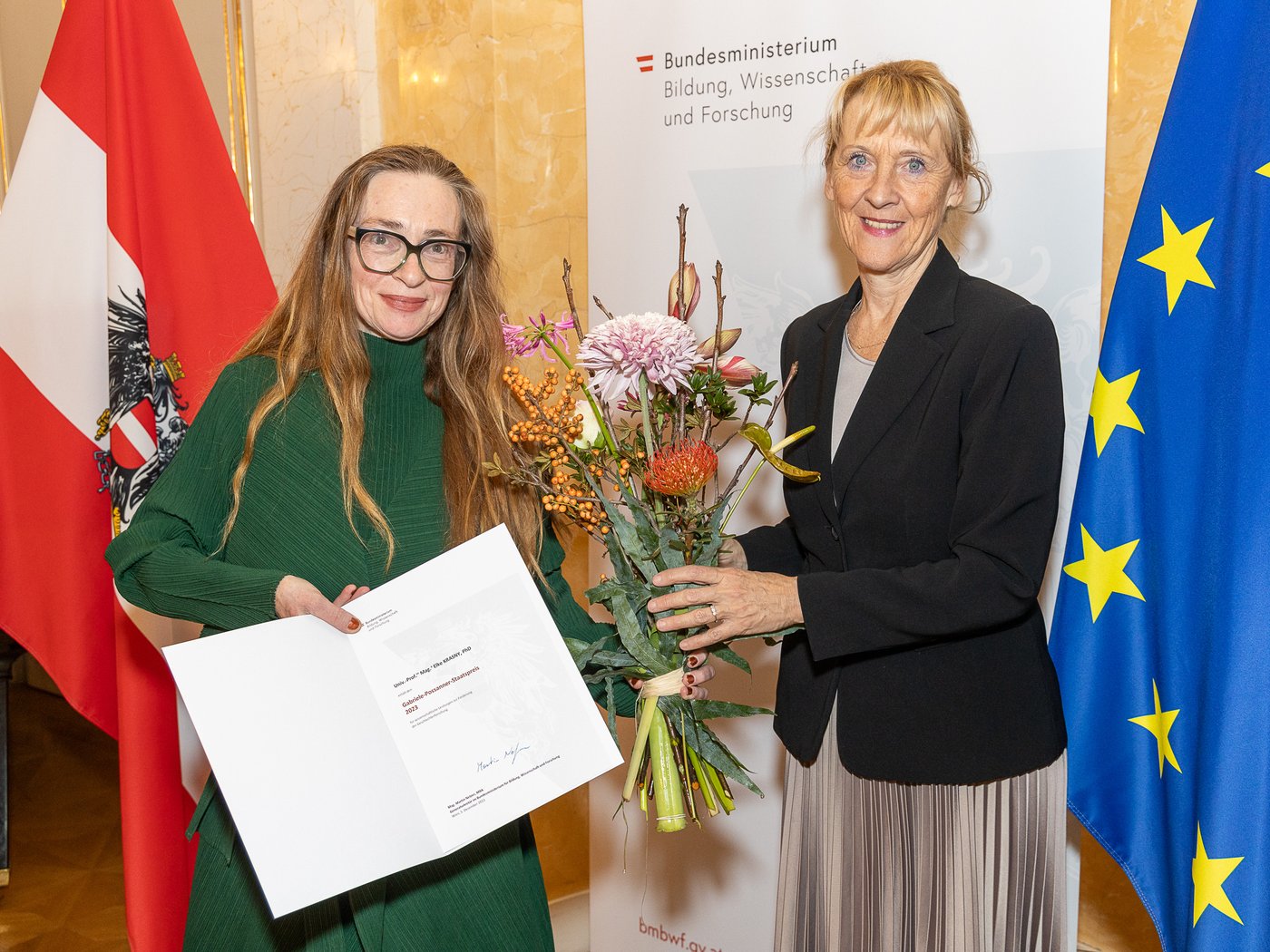Gabriele Possanner Prize 2023 goes to Elke Krasny
Prof.in Mag.a Elke Krasny, PhD is a feminist cultural theorist and curator. After a career as a freelance academic, she has been Professor of Art and Education at the Academy of Fine Arts Vienna since 2014.
Every two years since 1997, the BMBWF has awarded the Gabriele Possanner Prizes for scientific achievements that promote gender research in Austria. There is a state prize, an appreciation prize and two sponsorship prizes, which are awarded by the Federal Minister of Education, Science and Research on the recommendation of an international jury of experts appointed by him/her.
The Gabriele Possanner State Prize, endowed with 10,000 euros, is awarded to a person from the field of research and teaching whose scientific achievements sustainably promote gender research in Austria.
Reason for nomination:
In her academic, curatorial, teaching and mediating work, Elke Krasny has for decades consistently and critically pursued issues that address gender dimensions in architecture, art, curating and urbanism.
Krasny has established curatorial research as a feminist practice in an innovative and complex way and has combined long-term curatorial research projects such as Stadt und Frauen. Eine andere Topographie von Wien (City and Women. Another Topography of Vienna), she has combined the everyday urban experiences of women living in Vienna with historical urban research specific to women and the study of the collections of the Vienna City Hall Library. Her way of working is characterized by the fact that she promotes and facilitates the debate with and between different feminist positions, such as at the Women's Museum/Frauen:Museum symposium held in 2010. This symposium and the book published as a result in 2013 brought together for the first time curatorial working methods of women's museums that have emerged since the 1980s and feminist curatorial practices from the contemporary art field, especially from anti-colonial, diasporic and migrant positions. Elke Krasny was awarded the Austrian Artist Award-Women's Culture for the symposium.
Since the anthology Frauen:Museum. Politics of the Curatorial in Feminism, Education, History and Art, Elke Krasny has consistently and innovatively contributed to this new field of research in the theory and history of feminist curating and, in particular, promoted young curatorial researchers. As co-editor of a series of publications, she consolidated this field of research: Curating in Feminist Thought, together with Dorothee Richter and Lara Perry 2016; Radicalizing Care. Feminist and Queer Activism in Curating, together with Sophie Lingg, Lena Fritsch, Birgit Bosold and Vera Hofmann 2022; Feminist Curating as Organizing, together with Lara Perry 2023; Curating with Care, together with Lara Perry 2023.
Since 2012, Elke Krasny has been working on gender issues in the context of care, care work and ethical dimensions of care, and has contributed significantly to a 'caring turn' in architectural discourse and architectural practice. In particular, the exhibition curated together with Angelika Fitz, Critical Care. Architecture and Urbanism for a Broken Planet and the book of the same name published by MIT Press drew attention to architecture as a practice of caring. Elke Krasny has been invited internationally to give lectures and workshops on the gender dimensions of care in architecture and urbanism, including at the Women Deliver Americas 2023 conference in Bogota, at the SEA Conversations 2023 hosted by the School of Environment and Architecture in Mumbai, at the Visualizing Care conference at Duke University 2022. In autumn 2023, she will give a keynote lecture on care and architecture at the Architecture Humanities Research Association conference.
Together with Angelika Fitz and Marvi Mazhar, Elke Krasny has analyzed the life's work of Yasmeen Lari, the first woman to found an architecture firm in Pakistan, and thus made a significant contribution to a gender-critical and decolonial architectural historiography.
Furthermore, the reception of the exhibition shown at the Architekturzentrum Wien and the book published on the occasion of the exhibition, Yasmeen Lari. Architecture for the Future, published on the occasion of the exhibition, make it clear that such feminist curatorial architectural research provides essential and exemplary inspiration for architects and students who are looking for new ways of making architecture in the face of the climate catastrophe.
In her latest publication, Living with an Infected Planet. Covid-19, Feminism and the Global Frontline of Care, Elke Krasny uses the methodological tools of feminist cultural theory to analyze political speeches and policy documents. In particular, Krasny develops the analytical tools of feminist worry and feminist hope, as she insists that care has both epistemic and action-oriented dimensions and elaborates that the modern patriarchal separation of body and mind has led to the devaluation of care as knowledge. For these connections, she proposes the term care feminism based on her engagement with feminist reconstruction plans and the pandemic focus of feminist energies in activism, policy and research on care work.
Elke Krasny's feminist practice combines research, curating and teaching in exemplary and innovative ways to advance knowledge production in transnational, intersectional and intergenerational feminisms together with many others. Elke Krasny supports young feminist scholars in teaching and transnational exchange in order to counteract competitive isolation through collaborative solidarity. This is an expression of her attitude and methodological approach of combining concern and hope in a feminist research practice. Elke Krasny's concern is to use critical analysis to address the violence of dominant gender relations in the climate catastrophic present, which is characterized by the effects of genocidal and ecocidal pasts. Beyond critical analysis, Elke Krasny's work focuses on the investigation, support and further development of transformative and emancipatory practices in art, architecture, urbanism and curating in order to contribute to the realization of epistemic, social and ecological gender justice.
